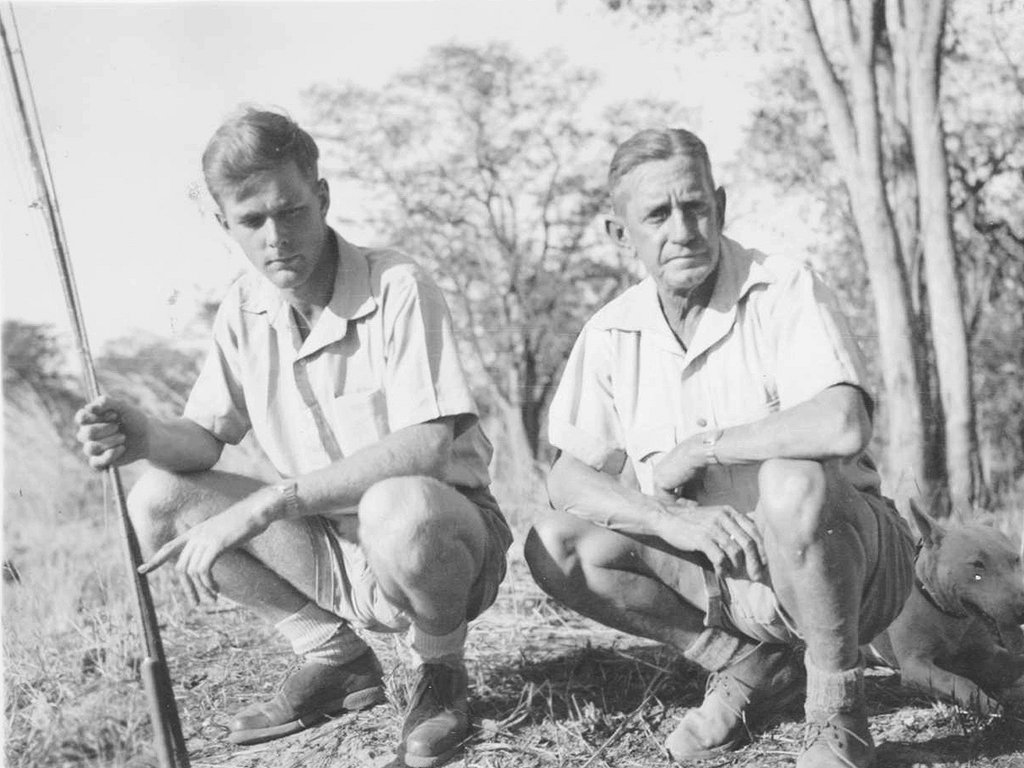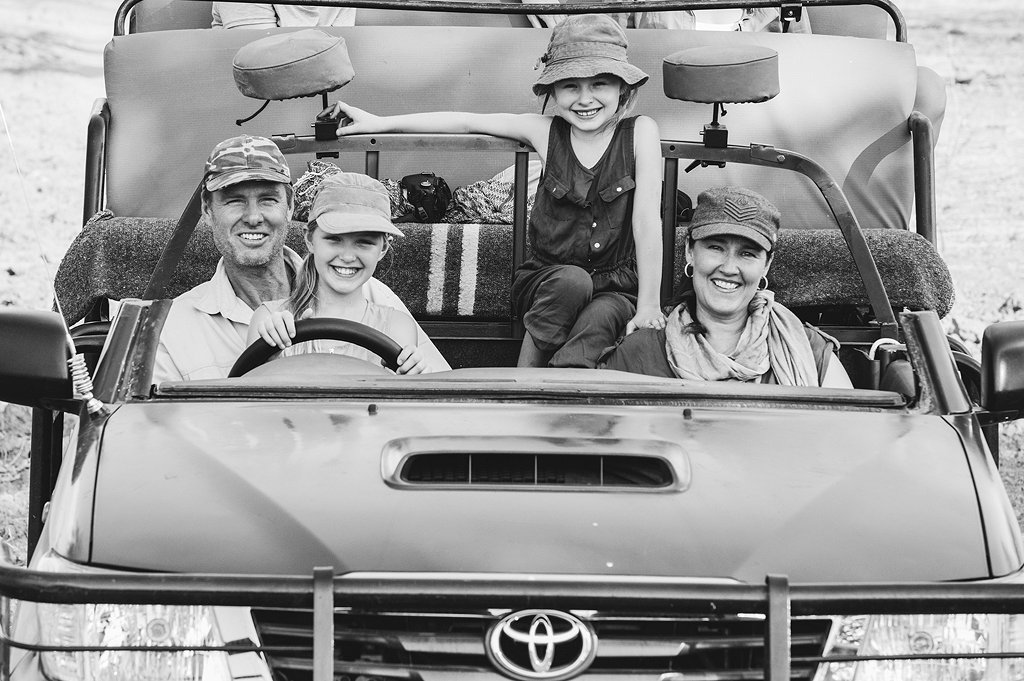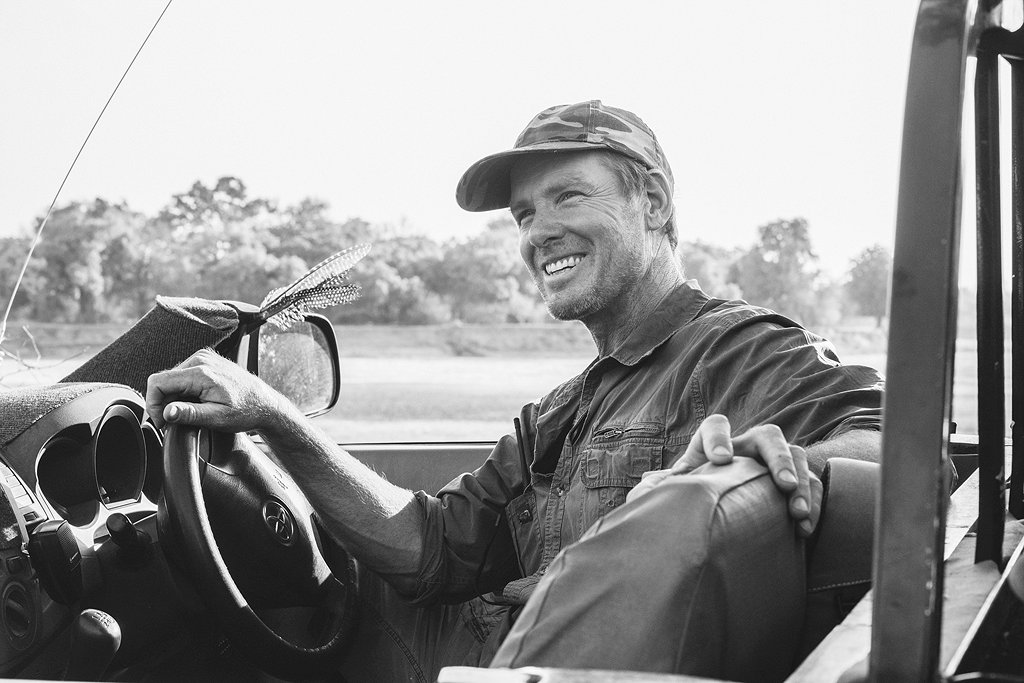Shenton Family
Zambian conservation family..
Shenton Family - over 60 years in Zambian wildlife management
Three generations of Shenton's have witnessed the evolution of conservation in Zambia.
Barry Shenton was born on 30th April 1929 in Eshowe, Zululand. His father, John Lindsay Shenton (‘Shen’), had moved to South Africa from Leicester, the UK as a baby with his grandparent’s in search of a new life in the gold reefs of Johannesburg in 1894. Shen worked as a mining engineer up to the Great War. He rose to the rank of captain and came back from service in Europe (one of three surviving officers of 150 in the Battle of Delville Wood) to a cattle/cotton farm. Barry’s mother Pat was a strong-willed Scot and third generation South African.
By 1936 the cotton had done well, but the cattle had been decimated by nagana, the often fatal tsetse disease, so Shen joined the Parks Board, and the family moved to Hluhluwe Game Reserve where Shen headed the Tsetse Control Department for Mukuzi, Umfolozi and Hluhluwe. The conflict between game and livestock escalated because of nagana and at one time the Parks Board was given orders to shoot all game to prevent further spread. Barry and his younger brother Bob both joined the Tsetse Control Unit and became good hunters until Shen organised six Martins bombers to spray DDT up to the boundaries of the reserves and this ended the tsetse conflict.
In 1948 the family moved north to Northern Rhodesia where they started farming eggs, citrus and maize on a piece of virgin land in Mazabuka. Times were tough, so Barry joined the Northern Rhodesian Game Department on 19th June 1950. His first posting was to Lundazi where he joined Bert Schultz as one of the first two professional hunters in the newly formed Government Conducted Hunting Scheme in the Luangwa Valley. He was based at the ‘Castle’ which was built and run by the DC Errol Button and was responsible for elephant control on crop raiders in Eastern Province in the rainy season. Fluent in Zulu, he now learnt Chinyanja and over the next five years was a full-time ranger opening up the west bank of the Luangwa Game Reserve to tourism.
In 1952 Barry blazed the boundaries of the area to which game reserve regulations would be applied in Chief Nsefu’s area, and he established a Game Guards Training Camp at Milyoti. Profits from commercial hunting in Chief Nsefu’s territory were given to the chief to develop his area – this is the earliest form of a community-based project of its kind, a system not unlike today’s Community Resource Boards. He built the first permanent camp in South Luangwa, Nsefu, and today the camp remains almost unchanged under the management of Robin Pope Safaris. Nsefu survived the floods of 2007 – for the 57th time – while many other newer structures have been washed away over the years, a testimony to the quality of service offered by those early government workers. The Nsefu Game Reserve was declared on 5th May 1966 which is of enormous historical significance, being the first area where wildlife viewing was established on the initiative of a local chief as a source of revenue. Over the next few years, Barry was posted to Kabompo and Kasempa, building the Nyika Rest Camp on the 8000-foot Nyika plateau.
In late 1958, the council gave the Game Department just 11 months to open up Kafue National Park (KNP) to tourism, failing which the area would lose its status and be resettled. Norman Carr selected Barry and Johnny Uys to help him, and between April and September 1958 Barry had built 900 kilometres of roads from Dundumwedzi in the south to the Busanga Plains in the north, and the two men had built six camps – Moshi, Ntemwa, Nanzila, Chunga, Lufupa and Kafwala. Roads were surveyed on foot and cleared behind by hand, then smoothed with a railway line triangle pulled behind a Land Rover. Bridges were built with rock and concrete around 44-gallon drum forms, all carted by an old three-ton Morris truck via Namwala. The Morris chassis eventually broke, and it was repaired with a mopane pole wrapped with wet buffalo hide – good enough to finish the job. By the end of 1959, the Game Department had won its challenge, and Africa’s most prominent national park at the time was open to visitors. Barry’s parents Pat and Shen ran Ngoma Lodge, the original hotel in the area built by the first warden, Len Vaughan. During this time Norman Carr had two lion cubs to care for, and once they were weaned from bottle milk, they were moved to Ngoma where Barry and Johnny Uys took care of them as they learnt to hunt and fend for themselves. The story of these two lions, Big Boy and Little Boy, is written in Norman Carr’s book, Return to the Wild.
In early 1961 Barry, Howard Alker, Johnny Uys and Bill Bainbridge transported and relocated the first six rhino from Natal to Mosi-oa-Tunya National Park. The rhino thrived until the last was poached in the mid-1980s.
One of the visitors in the dry season of 1961 was a pretty Swedish nurse who had settled at a mission hospital in eastern Rhodesia (Zimbabwe) and escorted her visiting parents to KNP in an old Morris Minor they had bought for the journey. The car developed a problem, and Barry took four days to fix it, by which time he had proposed marriage to her and Marianne, who loved the bush, moved to Kafue to join him and became his lifelong partner. Their first son Rolf was born in 1963, followed by Derek. Barry was dedicated to duty, efficiency and discipline and was promoted to warden of KNP from 1964 to 1966. In 1967-1968 he was transferred to Livingstone to become warden of Southern Province, responsible for Mosi-oa-Tunya National Park, Lochinvar and Blue Lagoon until 1968. Marianne worked as a nurse at the ‘non-fee-paying’ section of Batoka Hospital. In 1969 Barry was transferred to headquarters in Chilanga where his daughter Allison was born. And in 1970 his last posting in the Game Department was at Kasama, as warden of Northern Province.
By 1970, Zambians were ready to take over the Game Department, and Barry retired to manage brother Bob’s farm in Mazabuka where he farmed potatoes, tomatoes, maize and cattle. In 1975, his youngest son Clive was born. In 1982, Barry finally managed to buy his own farm in Mkushi and again adjusted quickly to the new environment. He proved, at 53, that one is never too old to start a new life and became one of Zambia’s most significant seed growers, growing both soya and maize. Barry diversified whenever opportunities arose, and ran a borehole drilling rig, contracted harvested maize, and built Kaingo under Shenton Safaris in South Luangwa National Park in 1992 with his son, Derek. In 1994, when the Great North Road was almost impassable, he began his last major project: the Forest Inn. The well-appointed, peaceful Forest Inn has become the place to stay for nearly all visitors to Mkushi.
Barry slipped quietly away 2007 on 21st March in his bed and surrounded by his wife and children, surely a satisfied man, having overcome all his life’s challenges, including his first cancer 15 years ago. His youngest son, Clive, will continue managing the farm and the Forest Inn. Barry’s children and grandchildren have kept his sense of nation-building, social conscience and sustainable resource management.
Courtesey: Shenton Safaris
DEREK SHENTON & KAINGO CAMP
Twenty-five years ago, I began the construction of Kaingo on the banks of the Luangwa River. My father, Barry had spent twenty years in Zambia’s game department, during that time he had sited and built eleven camps in various National Parks around the country. His wisdom, patient counselling, and experience laid the foundation for Shenton Safaris; his choice of site and camp layout was crucial. My mother, Marianne spent many hours working with us on the build; her Swedish flair was put to great use particularly in the setting up of the kitchen and creations of handmade batiks for soft furnishings.
I had worked and trained as a safari guide in the Luangwa and having my own camps was a dream for me! I was just a kid, but had committed to building and running the new business and applied myself with vigour to the task. With an Ag Management degree and the experience of growing up on an African farm under my belt, I was eager for the challenge. By the end of 1992 we had 4 chalets and the main dining “chitenge”, staff housing and our kitchen built. I wanted an organic looking bar and obtained permission to use a massive thousand-year-old leadwood tree that had fallen halfway into the river near our hippo hide site.
Using our farm equipment, practical skills and local manpower (several of whom remain part of the family today, including our head guide, Patrick) we managed to set ourselves up with the emphasis on self-sustainability; by midway through 1993 we were ready to open our doors to guests. Shenton Safaris was up and running! Four years later we added two more chalets to Kaingo and built our bush camp, Mwamba along the nearby Mwamba River.
Over the years we have matured as a company and developed our unique style of “nature first”, adapting our network of hides and blinds to get closer to the mammals and birds that make up the rich fauna around us. These hides are a wonderful place to sit for photographers and nature lovers alike. The camps are organically integrated into this most bountiful part of the ancient rift valley and nature is at home here. I was reminded again of this during our first week of operation when we had a lioness spend an afternoon under one of the decks in the middle of camp.
So 25 seasons later, after one or two small life changes including the birth of two beautiful daughters, and with the rebuild complete I am still on the riverbank at Kaingo, my favourite place in the world, guitar in hand watching the river flow.
ARTICLES OF INTEREST
Go back to: Families in conservation
OBITUARY: J.B. Shenton of the Kafue National Park (1929 - 2007)
John Barry Shenton was born on the 30th April 1929 in Eshowe Zululand. His father “Shen” had moved to South Africa from Leicester, UK as a baby with his grandparents in search of a new life in the gold reefs of Johannesburg in 1894 and Shen followed his father as a mining engineer up to the Great War. Captain John Lindsay Shenton “Shen” came back from Europe to a cattle/cotton farm. Barry’s mother Pat was a strong-willed Scot of third generation in South Africa. By 1936 the cotton had done well but the cattle had been decimated by Nagana, the deadly tsetse disease and when Shen joined the Parks Board, the family moved to Hluhluwe game reserve that year until the time they trekked north to Zambia in 1948. The conflict between the three small game reserves in Zululand and the livestock escalated because of Nagana and at one time the game department were given orders to shoot all the wild animals to prevent further spread. Barry and his younger brother Bob became good hunters until Shen organized six Martins bombers to spray DDT up to the boundaries of the reserves and this stopped the tsetse conflict. Barry served for a couple of years in the Natal Parks Board before accompanying his parents to Northern Rhodesia where Pat farmed chickens for eggs while the two men opened up a virgin piece of land in Mazabuka. It is remarkable that the eggs were sent by train to the Copperbelt with the train guard, and the money and the boxes returned on the next train.
Times were tough with the first crop yielding 35 bags of maize, so Barry joined Bert Schultz as a professional hunter in the newly formed Northern Rhodesia Game Department in 1950 on the Government Controlled Hunting scheme in Luangwa Valley. Wealthy overseas clients would pay to hunt wildlife on Chief Nsefu’s reserve and the profits were given to the chief to develop his area – a system not unlike today’s Community Resource Boards. These early rangers became testers for Mr. Bata who would come out every year with shoes modified for the tough environment in Luangwa. Barry ended up with a cupboard full of shoes like Imelda Marcos- rope soles, tall mosquito boots, and many versions of the “veld skons” that most bush people preferred in the end. These shoes were nick-named “brothel creepers”. The first camp they built, Nsefu, survived the floods this year, for the 57th time while many other newer structures have been washed away over the years, a testimony to the quality of service offered by those early government workers.
Barry spent an exciting four years hunting in the dry season and controlling elephant in the wet season by shooting crop raiding bulls in the villages around eastern province. He had grown up fluent in Zulu and now learnt ChiNyanja. Over the next five years Barry was a full time ranger opening up the west bank of the Luangwa game reserve to tourism and also postings to Kabompo, Kasempa and Lundazi where he built the Nyika Lodge on the 8000ft plateau.
In late 1958, the council gave the game department just eleven months to open up Kafue National Park to tourism, failing which the area would lose its status and be re-settled. Norman Carr selected Barry and Johnny Uys to help him and over a very hectic year, they managed to open up 900km of road and build Ngoma Lodge and two bush camps under very challenging conditions. Roads were surveyed on foot and cleared behind by hand to then be smoothed with a railway line triangle pulled behind a Landrover. Bridges were built with rock and concrete around 44-gallon drum forms, all carted by an old three ton Morris truck via Namwala. The Morris chassis eventually broke, and it was repaired with a mopane pole wrapped with wet buffalo hide - good enough to finish the job. By the end of 1959, the game department had won its challenge, and Zambia’s biggest National Park was open to visitors. Barry was a painfully shy man in those days but dedicated to duty, efficiency and discipline and was promoted to Warden of KNP in 1964, while his parents ran Ngoma Lodge.
One of the visitors in the dry season of 1961 was a pretty Swedish nurse who had settled at a mission hospital in eastern Rhodesia (Zimbabwe) and escorted her visiting parents to KNP in an old Morris they had bought for the journey. The car developed a problem and Barry took four days to fix it, by which time he had proposed her for marriage and in 1963, their first son Rolf was born. Marianne loved the bush and moved to KNP to become his lifelong partner, bearing three sons and a favourite daughter, Allison who lives in Livingstone. Marianne, always a socialist, a nurse and a great traveller, mellowed Barry’s colonial past and shyness and he adapted positively to the new Zambia when droves of Europeans left.
By 1970, Zambians were ready to take over the Game Department, and Barry retired to manage brother Bob’s farm in Mazabuka. He attacked this job with the same vigour and determination as always and within two years produced the first crop of tomatoes on top of seed maize and cotton. The first half of the crop was given away in the Mazabuka market as no-one had the taste for this new fruit. Suddenly the taste caught on and Barry couldn’t produce enough for the next few years. He also introduced potatoes to Mazabuka’s growing list of produce and used to sell them off the back of the truck in Lusaka’s city market. Barry was always up- to-date with new ideas and bought a new diesel Mercedes from Germany in 1969 forseeeing the fuel crisis. This car is still driving around Lusaka.
In 1982, Barry finally managed to buy his own farm in Mkushi and again adjusted quickly to the new environment. He proved, at 53, that one is never too old to start a new life and became one of Zambia’s biggest seed growers, both in soya and maize. Barry diversified whenever opportunities arose, and ran a borehole drilling rig, contract harvested maize, and built Kaingo Safari Lodge in South Luangwa National Park in 1992 with his son, Derek. In 1994, when the Great North Road was almost impassable, he began his last major project: The Forest Inn. Friends and family advised him that it was a bad time to build with all the uncertainty, but as usual he responded by saying he might not have the energy to start later and that the road would be fixed sooner or later, and so he did it anyway! The well-appointed, peaceful Forest Inn has become the place to stay for almost all visitors to Mkushi with all creeds and colours welcome for business or leisure.
Barry slipped quietly away on the 21st of March in his bed surrounded by his wife and children, surely a satisfied man, having beaten all his life’s challenges, including a first cancer fifteen years ago. Youngest son, Clive will continue managing the farm and the Forest Inn. His children and grandchildren have continued his sense of nation building, social conscience and sustainable resource management.
Courtesey: Rolf Shenton - http://zambiaconservation.blogspot.com/2007/04/obituary-jb-shenton-of-kafue-national.html
.jpg)


